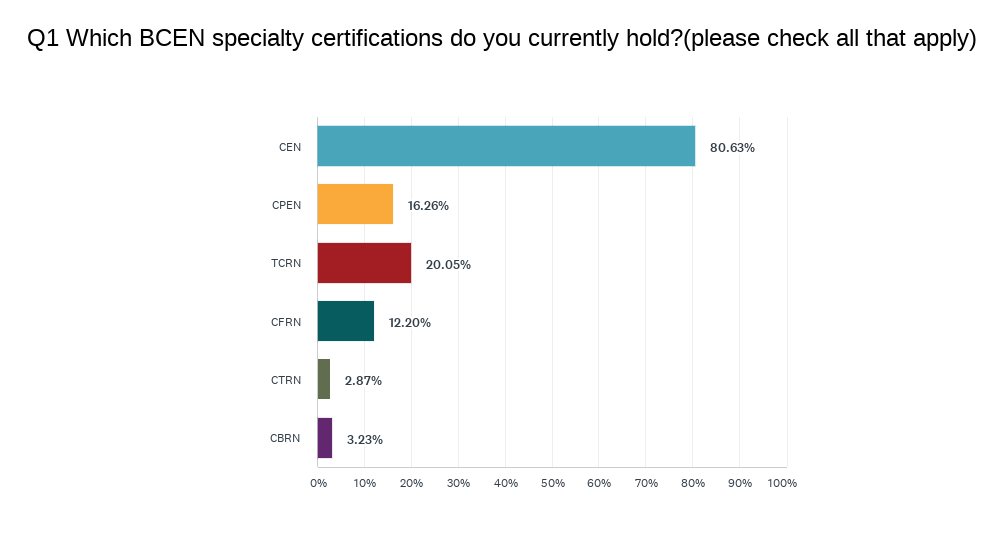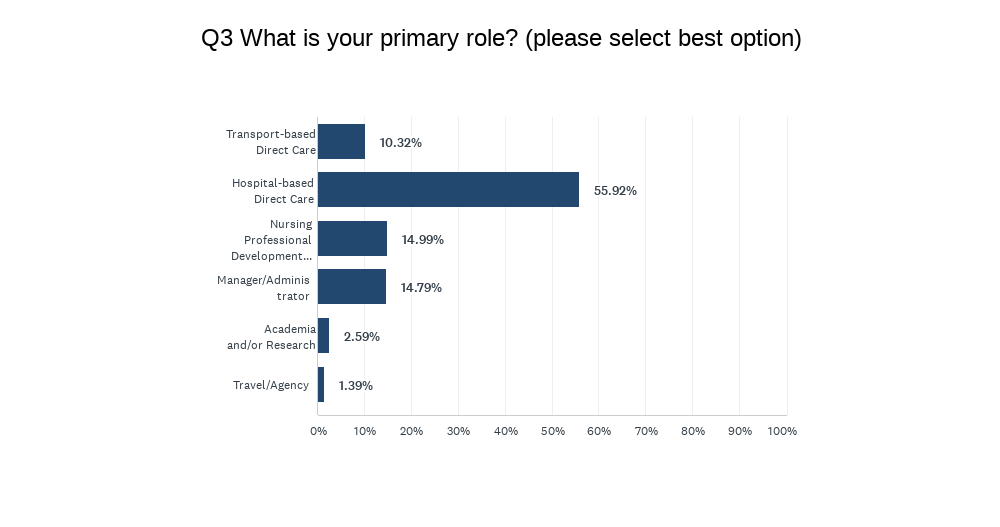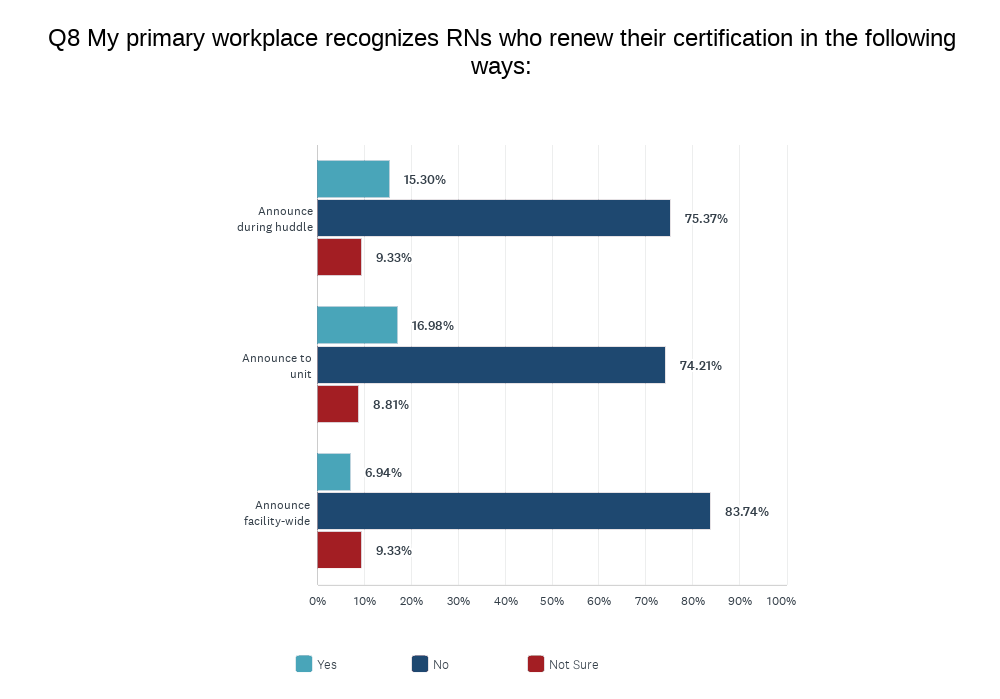The 2025 BCEN Culture of Certification Support Survey focused on exploring how board certified RNs in six specialty areas — adult/mixed and pediatric emergency, trauma and burn, and flight and critical care ground transport — perceive organizational encouragement, support, incentives, rewards, and recognition for specialty certification.
Executive Summary | Methodology | Demographics | Rewards & Incentives | Recognition | Overall Support | Open Feedback | Resources & Volunteer Opportunities
2025 BCEN Culture of Certification Support Survey: Executive Summary ✍️
In February-March 2025, BCEN surveyed board certified RNs across six emergency nursing specialties to understand workplace support for nursing specialty certification and inform future advocacy and resource development efforts. 🔗 Read BCEN’s news release about the survey.
- Over 2,500 nurses certified through BCEN responded, gauging employer encouragement, support, rewards and incentives, and recognition for initial certification and recertification.
- Across all categories, initial certification was supported more robustly than recertification, with rewarding/incentivizing and recognizing nurses who maintain specialty certification representing the greatest opportunities for improvement.
- Notably, gaps remain in both communication and implementation of certification supports, with many workplaces still not addressing common barriers or following best practices for supporting certification.
- While approximately three-quarters of respondents said their primary workplace supports their professional development and nursing specialty certification overall, support for maintaining specialty certification is notably less robust than support for initial certification.
- Respondents also evaluated BCEN’s free certification support resources and reported awareness of BCEN volunteer SME roles.
Survey Methodology 🧪
Of the 43,233 nurses certified through BCEN invited to participate, 2,509 completed the online survey (5.8% response rate) conducted from February 1 to March 7, 2025. Respondents represented the full spectrum of BCEN certifications and a variety of workplace settings and roles, including more than 55% in hospital emergency departments, 55% in hospital-based direct care, over 15% in nursing professional development, and nearly 15% in managerial or administrative positions. This representativeness across certifications, roles and settings supports confidence in the survey findings.
Respondent Demographics 🌐
Survey respondents largely mirrored the overall population of nurses certified through BCEN in the distribution of certifications held and also represented a wide spectrum of workplace settings and primary roles.
Q1: BCEN Specialty Certification(s) Held
 Note: Total certifications held exceeds number of respondents as some RNs hold multiple BCEN credentials.
Note: Total certifications held exceeds number of respondents as some RNs hold multiple BCEN credentials.
Q2: Primary Workplace Setting

Q3: Primary Role

For details, see Questions 1-3 in the data report. 📖
How Organizations Encourage, Support, Reward and Incentivize Initial Certification and Recertification 🏅
Respondents assessed whether their primary workplace engages in specific practices that encourage, support, and reward or incentivize both initial certification and renewals. Key findings—including opportunities for improvement—are highlighted below.
Q4: My primary workplace encourages RNs to consider nursing specialty certification.
Percent listed indicates respondents who strongly agree or agree.
Key Insight: The majority of organizations encourage nursing specialty certification throughout an RN’s tenure.
- 62% during onboarding/orientation
- 64% during annual performance reviews
- 65% on an ongoing basis
Opportunities for Improvement: Fewer organizations demonstrate two key certification support best practices of leaders “walking the talk” and mentoring.
- 43% require some/all nurse leaders to model certification by being specialty certified
- 26% host a formal mentorship program
Q5: My primary workplace supports specialty certification in the following ways…
Based on yes, no, or not sure responses.
Key Insights: Employers most commonly support initial certification by reimbursing for the exam fee if a nurse passes the exam and by funding continuing education opportunities and certification preparation materials. Offering paid time off to earn certification was the least reported support strategy.
- 58% reimburse for initial exam fee, albeit only if they pass (13% said their employer reimburses whether or not they pass)
- 57% offer facility-fund CEs
- 45% offer free study and reference materials
- 12% offer paid time off to sit for initial certification
Opportunities for Improvement: When it comes to recertification, employer support drops off.
- 71% do not pay up front (or use a voucher) for recertification fee
- 51% do not reimburse for recertification fee
Q6: My primary workplace rewards and incentivizes specialty certification in the following ways…
Based on always, sometimes, not sure, and no responses.
Key Insight: Employers most often reward and incentivize specialty certification through clinical ladders or career advancement programs.
- 55% said their employer does so always or sometimes (although 11% were not sure)
Opportunities for Improvement: While the body of specialty certification research indicates financial barriers are a major obstacle for RNs aiming to be board certified in their specialty, most employers do not offer incentives or rewards to offset the cost—with support particularly limited for recertification.
- 55% do not increase wage/pay for initial certification
- 71% do not offer a bonus for initial certification
- 77% do not increase wage/pay for recertification
- 81% do not offer a bonus for recertification
Unclear or absent support for certification-linked opportunities, as reported by nurses, leaves many potential incentives and career rewards untapped.
- Leadership roles require specialty certification: 49% no / 16% don’t know
- Promotions contingent on certification: 55% no / 19% don’t know
- Special opportunities contingent on certification (research, QI/PI initiatives, shared governance): 58% no / 21% don’t know
For full details, see Questions 4-6 in the data report. 📖
How Organizations Recognize Initial Certification and Recertification 🥳
Survey participants were asked to assess the internal and external ways their workplace recognizes initial certification as well as the internal recognition of recertification.
Q7: My primary workplace recognizes RNs who earn initial certification in the following ways…
Based on yes, no and not sure responses across multiple types of internal and external recognition.
Key Insight: Nurses are most often recognized for initial certification by displaying their credential on their badge (66% yes), announcing to their unit (61% yes), and celebrating their certification status during Certified Nurses Day (54% yes).
Opportunity for Improvement: While strongest at the point of care, recognition of newly certified RNs increasingly diminishes at the facility and community level. This represents a missed opportunity to more powerfully support specialty certification while showcasing an organization’s commitment to nursing and patient care excellence across facilities, systems and communities.
- Showcase publicly in unit or facility: 53% no
- Announce facility-wide: 65% no
- Announce to the community: 82% no

Q8: My primary workplace recognizes RNs who renew their certification in the following ways…
Based on yes, no and not sure responses focused solely on internal recognition.
Key Insight/Opportunity for Improvement: Few employers acknowledge nurses who maintain specialty certification—the lowest area of reported support in this survey—with 75% reporting that ongoing specialty certification is not celebrated in huddles, nor announced to the unit (74%), nor announced facility-wide (84%).
For full details, see Questions 7-8 in the data report. 📖
For more on recognizing and supporting maintenance of certification—including best practices shared by professional development practitioners, nurse leaders, administrators, CNOs and other hospital executives, see BCEN’s latest research-backed white paper “Sustaining Specialty Excellence: Why RNs Thrive Through Recertification.” 📑
The Big Picture: Culture of Certification & Professional Development 🤝
Respondents were asked to rate their perception of their workplace’s overall culture of certification support and support for their overall professional development.
Q9: Overall, my primary workplace has a culture of certification support for initial specialty certification/renewal of specialty certification.
Most nurses report their primary workplace has an overall culture of support for nursing specialty certification, albeit with notably less robust support for recertification:
- 72% support initial certification (30% strongly agree/42% agree)
- 54% support recertification (19% strongly agree/35% agree)
Q10: My primary workplace supports my overall professional development.
A large majority (77%) indicated their employers support their overall professional development, with 26% strongly agreeing and 51% agreeing, while 19% disagreed and 4% strongly disagreed.
For full details, see Questions 9-10 in the data report. 📖
Open Comments: What Nurses Said About Employer Support of Specialty Certification 💬
Over 1,400 nurses provided open-ended comments about how their primary workplace encourages, supports, rewards and recognizes nursing specialty certification. Below are four takeaways based on the most common responses.
4 Themes from Nurses’ Feedback
1. Organizational Goals Often Supersede Direct Support
- Many reported specialty certification is only mentioned or urged with respect to earning or maintaining Magnet status, or as a clinical ladder or career advancement requirement.
- Even in workplaces that advocate for specialty certification, it’s not always recognized, rewarded or celebrated – or sometimes, even acknowledged.
2. Nurses’ Motivation is Primarily Intrinsic
- Many said they pursue certification for personal or professional growth, not because of workplace support or culture.
3. Lackluster Financial Support Hinders Motivation and Momentum
- Financial support for certification—from coverage of, or reimbursement for, exam fees and prep materials to pay increases or bonuses—is highly variable and often seen as not reflective of nurses’ investment of time, effort, and cost—nor their resulting expertise.
- Cumbersome reimbursement processes discourage pursuit of certification and are often available only if you pass the exam.
- Financial support for recertification or earning multiple credentials is even more lacking than support for initial certification.
4. Certification Champions Exist—But Coordinated Organizational Support Falls Short
- Support for certification was stronger among nurses or within certain departments than across organizational leadership or hospital administration. Nurses also noted that support varies widely between facilities, departments, and roles, leading to inequity and confusion.
- Some even shared that management doesn’t understand the value of specialty certification.
For nurse leaders, hospital administrators and organizational executives, these themes and insights gleaned from nurses’ direct feedback may reveal potential new avenues to spark change within your own certification programs.
Bonus Questions: Free Certification Support Resources & SME Volunteer Opportunities 📚
Nurses were asked optional questions about whether they had accessed and found BCEN’s free certification support resources useful, as well as their awareness of opportunities to volunteer with BCEN as subject matter experts.
BCEN Free Certification Support Resources
Greatest awareness was of free CE webinars hosted on the BCEN Learn continuing education platform (among the 2,461 respondents, 40% accessed/found useful, 22% aware but not accessed, and 30% not aware but plan to explore).
Between one-third and one-half were not aware but plan to explore these free resources: Make Your Case, Support Your Nurses, and Nurse Recognition toolkits, along with Test Anxiety Tips & Advice, with 50% planning to explore BCEN’s white paper series.
SME Volunteer Opportunities
Of the 2,461 respondents, fewer than half were aware of opportunities to volunteer with BCEN as exam item writers (45%) and practice exam item writers (44%). About 65% were unaware they could volunteer as BCEN Learn CE course content developers, webinar presenters, and Learn Live conference presenters.
For a recent directory of BCEN resources and volunteer opportunities, check out the 2025 Resources Special Edition of BCEN’s newsletter. 📰
BCEN sincerely thanks each nurse who took the time to share their experiences and feedback with us in this survey. Stay connected with BCEN by signing up for email updates and following us on social media to see how we’re turning your insights into action!
